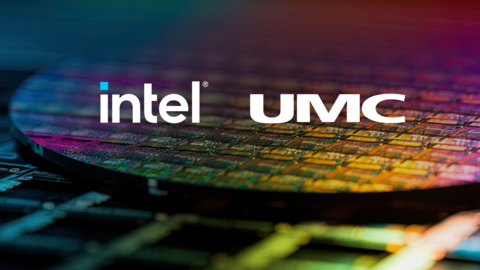Intel and UMC Announce New Foundry Collaboration
- None.
- None.
Intel's strategic collaboration with UMC to develop a 12-nanometer process platform is a significant move within the semiconductor industry. This partnership aims to capitalize on high-growth markets and could potentially reshape market dynamics by providing a more resilient supply chain and diversified geographic production capabilities. The semiconductor industry is known for its cyclical nature and sensitivity to supply chain disruptions, making this collaboration particularly pertinent in the context of recent global chip shortages. By leveraging Intel's manufacturing capacity in the U.S. and UMC's foundry experience, the two companies are positioning themselves to offer a compelling value proposition to customers seeking advanced technology nodes combined with supply chain stability.
The announcement may have a positive impact on investor sentiment towards both companies, as it demonstrates proactive steps to address industry challenges and customer needs. The strategic nature of this partnership is also indicative of a broader industry trend towards consolidation and collaboration to mitigate risks and optimize resources. From a market perspective, this could lead to increased competition among foundries and potentially drive innovation and efficiency improvements across the sector.
The financial implications of this collaboration between Intel and UMC are multifaceted. For Intel, this move is aligned with its goal of becoming the world's second-largest foundry by 2030, signaling a strong commitment to expanding its foundry services and potentially increasing its market share. The use of existing equipment in Intel's fabs for the development of the 12 nm process could lead to cost efficiencies, optimizing capital expenditure and potentially improving margins in the long run. Investors will likely monitor how this strategic move contributes to Intel's revenue growth and margins in the high-growth markets targeted by this collaboration.
For UMC, the partnership with Intel provides an opportunity to accelerate its development roadmap and expand its capacity, which could translate into higher revenue streams and a stronger competitive position in the foundry market. The collaboration may also enhance UMC's attractiveness to customers looking for advanced process capabilities combined with supply chain security. The financial markets will be keen to assess how this collaboration impacts UMC's financial performance, particularly in terms of revenue diversification and operational efficiency.
The choice of the 12-nanometer process node and FinFET technology is a strategic one, as it represents a mature yet high-performance option that is suitable for a variety of applications, including mobile, communication infrastructure and networking. The 12 nm node with FinFET architecture offers a balance of performance and power efficiency, making it an attractive option for customers. This collaboration signifies a strategic emphasis on mature nodes, which are still in high demand for many applications that do not require cutting-edge technology but prioritize reliability and cost-effectiveness.
Intel's and UMC's joint efforts in enabling electronic design automation and intellectual property solutions from ecosystem partners are crucial for customer adoption of the new process. The production timeline, with an expected start in 2027, suggests a long-term view and underscores the extensive R&D and investment required to bring such semiconductor innovations to market. The industry will be observing how this collaboration influences the pace of innovation and the availability of advanced process technologies, particularly in the context of the recent U.S. government focus on bolstering domestic semiconductor manufacturing.
NEWS HIGHLIGHTS
- Companies to collaborate on the development of a 12-nanometer process platform targeting high-growth markets.
-
Collaboration builds on Intel’s commitment to partnering with innovative companies in
Taiwan to help the company better serve global customers and expand its mature process capabilities for foundry customers. - Deal broadens customer access to a geographically diverse semiconductor supply chain.
- Collaboration provides UMC with additional capacity, accelerates its development roadmap and demonstrates its leading process technology R&D.

Intel Corp. and United Microelectronics Corp. announce that they will collaborate on the development of a 12-nanometer semiconductor process platform to address high-growth markets. (Credit: Intel Corporation)
“Taiwan has been a critical part of the Asian and global semiconductor and broader technology ecosystem for decades, and Intel is committed to collaborating with innovative companies in
Jason Wang, UMC co-president, said, “Our collaboration with Intel on a
The 12 nm node will utilize Intel’s
The two companies will work to satisfy customer demand and cooperate on design enablement to support the 12 nm process by enabling electronic design automation and intellectual properties solutions from ecosystem partners. Production of the 12 nm process is expected to begin in 2027.
Intel has been investing and innovating in the
UMC has a more than 40-year history of being a preferred supplier of foundry services to critical applications including automotive, industrial, display and communications. Over the past two decades, UMC has successfully expanded its base across
Forward-Looking Statements
This communication contains certain forward-looking statements related to the proposed transactions between Intel and UMC and certain of their affiliates, including statements regarding the benefits and the timing of the transactions. Words such as “expect,” “plan” and “will” and variations of such words and similar expressions are intended to identify such forward-looking statements. Such statements are based on management expectations as of the date of this communication and involve risks and uncertainties, many of which are beyond the parties’ control, that could cause actual results to differ materially from those expressed or implied in such forward-looking statements. Such risks and uncertainties include, among others, business interruptions related to the supply chains of Intel and UMC; inability to develop or sell products successfully under the collaboration between Intel and UMC; delays, disruptions, challenges or increased costs in Intel’s or UMC’s construction or manufacturing expansion of fabs, whether due to events within or outside of Intel’s or UMC’s control; expected benefits, including financial benefits, of the transactions may not be realized; litigation or dispute related to the transactions or otherwise; unanticipated costs may be incurred or undisclosed liabilities assumed; risks related to diverting management’s attention from Intel’s or UMC’s ongoing business operations; UMC’s ability to develop and execute an effective and profitable go-to-market strategy; potential adverse reactions or changes to business relationships (including customers and suppliers) resulting from the announcement of the transaction; macroeconomic conditions, including the general economic conditions affecting the semiconductor industry; regulatory restrictions; impact of competitive products and pricing; hiring and retention of key employees; international conflict; and other risks detailed in Intel’s filings with the Securities and Exchange Commission (the “SEC”), including those discussed in Intel’s most recent Annual Report on Form 10-K and in any subsequent periodic reports on Form 10-Q and Form 8-K, and in UMC’s most recent Annual Report on Form 20-F and in any subsequent periodic reports on Form 6-K, each of which is on file with or furnished to the SEC and available at the SEC’s website at www.sec.gov. SEC filings for Intel are also available on Intel’s Investor Relations website at www.intc.com. SEC filings for UMC are also available on UMC’s Investor Relations website at www.UMC.com. Readers are cautioned not to place undue reliance on these forward-looking statements, which speak only as of the date of this communication. Unless otherwise required by applicable law, Intel and UMC undertake no obligation to update these forward-looking statements, whether as a result of new information, future events or otherwise.
About Intel
Intel (Nasdaq: INTC) is an industry leader, creating world-changing technology that enables global progress and enriches lives. Inspired by Moore’s Law, we continuously work to advance the design and manufacturing of semiconductors to help address our customers’ greatest challenges. By embedding intelligence in the cloud, network, edge and every kind of computing device, we unleash the potential of data to transform business and society for the better. To learn more about Intel’s innovations, go to newsroom.intel.com and intel.com.
About UMC
UMC (NYSE: UMC, TWSE: 2303) is a leading global semiconductor foundry company. The company provides high-quality IC fabrication services, focusing on logic and various specialty technologies to serve all major sectors of the electronics industry. UMC’s comprehensive IC processing technologies and manufacturing solutions include Logic/Mixed-Signal, embedded High-Voltage, embedded Non-Volatile-Memory, RFSOI, BCD etc. Most of UMC's 12-in and 8-in fabs with its core R&D are in
© Intel Corporation. Intel, the Intel logo and other Intel marks are trademarks of Intel Corporation or its subsidiaries. Other names and brands may be claimed as the property of others.
View source version on businesswire.com: https://www.businesswire.com/news/home/20240124594394/en/
Michael Anderson
Intel Investor Relations
1-916-356-7704
michael.d.anderson@intel.com
Sophie Won
Intel Media Relations
1-408-653-0475
sophie.won@intel.com
Jolie Chiu
UMC
886-3-578-2258 x31318
jolie_chiu@umc.com
Source: Intel Corp.
FAQ
What is the collaboration between Intel and United Microelectronics Corporation about?
What is the expected start date for the production of the 12 nm process?
Where will the new process node be developed and manufactured?
What are the benefits of the collaboration for UMC's customers?







